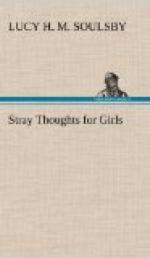“Evil is wrought by
want of thought,
As well as want
of heart.”
However, I do not intend to make this my closing quotation, as I am sure my children will have plenty of both heart and thought, and that they will shed around them a full supply of that sunshine which the weather seems so determined to deny us! I suppose we must allow, with Southey’s old woman, that “any weather is better than none,” but it is incontestable that we seem likely to have every opportunity afforded us, during these holidays, at all events, of
“Making a sunshine in a shady place.”
Sunday.
In many ways this is a disquieting age in which to live, and yet it is also markedly hopeful. It is true that the power of authority and of custom is crumbling on many sides, but surely this should lead to the laying of deeper and truer foundations. In this very question of Sunday, the Fourth Commandment used to settle the question, whereas now we investigate its origins and claims in a way which sounds rebellious and unfilial. Yet it may be nearer the mind of Christ than unthinking obedience, for the servant accepts with blind obedience this or that rule spoken by his master; the friend, the son, strives to understand “his father’s innermost mind.” He may or may not be convinced that certain words spoken on Mount Sinai, about the Jewish Sabbath, were intended to refer to the Christian Sunday; but, in either case, he realizes the nature of the spiritual life, and perceives that worship and thought and time are essential to it. He sees that the old Jewish rule tends to develop this spiritual life, and therefore, until he finds a better way, he feels it morally binding on himself; not because it was a Jewish rule, but because it assists his own growth.




